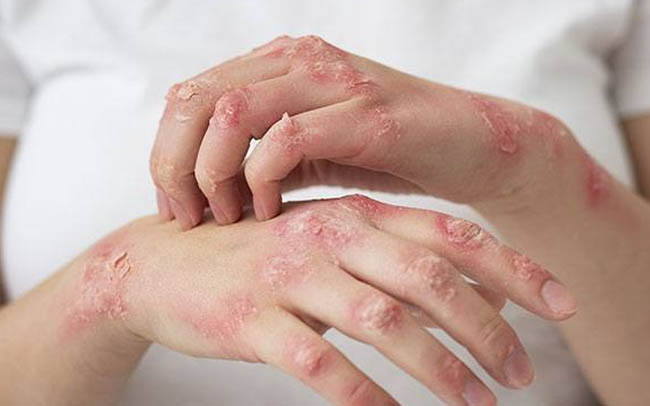Psoriasis symptoms differ from person to person and depend on the type of psoriasis you have. Areas of psoriasis can be as small as a few flakes on your scalp or elbow, or cover the majority of your body.
The most common symptoms of plaque psoriasis include:
- Raised, inflamed patches of skin that appear red on light skin and brown or purple on dark skin
- Whitish-silver scales or plaques on the red patches or gray scales on purple and brown patches
- Dry skin that may crack and bleed
- Soreness around patches
- Itching and burning sensations around patches
- Thick, pitted nails
- Painful, swollen joints
- Not every person will experience all these symptoms. Some people will experience entirely different symptoms if they have a less common type of psoriasis.
Psoriasis is not contagious. You cannot pass the skin condition from one person to another. Touching a psoriatic lesion on another person will not cause you to develop the condition.
Doctors are unclear as to what causes psoriasis. However, thanks to decades of research, they have a general idea of two key factors:
• Genetics
• The immune system
• Immune system
Psoriasis is an autoimmune condition. Autoimmune conditions are the result of your body attacking itself. In the case of psoriasis, white blood cells known as T cells mistakenly attack your skin cells.
Generally, in the body, white blood cells are deployed to attack and destroy invading bacteria and mount a defense against infections. This mistaken autoimmune attack causes the skin cell production process to go into overdrive. The sped-up skin cell production causes new skin cells to develop too quickly. They are pushed to the skin’s surface, where they pile up.
This results in the plaques that are most commonly associated with psoriasis. The attacks on the skin cells also cause red, inflamed areas of skin to develop.
Some people inherit genes that make them more likely to develop psoriasis. If you have an immediate family member with the skin condition, you are at an increased risk of developing psoriasis.
Two tests or examinations may be necessary to diagnose psoriasis.
Most doctors can make a diagnosis with a simple physical exam. Symptoms of psoriasis are typically evident and easy to distinguish from other conditions that may cause similar symptoms.
If your symptoms are unclear, or if your doctor wants to confirm their suspected diagnosis, they may take a small sample of your skin. This is known as a biopsy.













